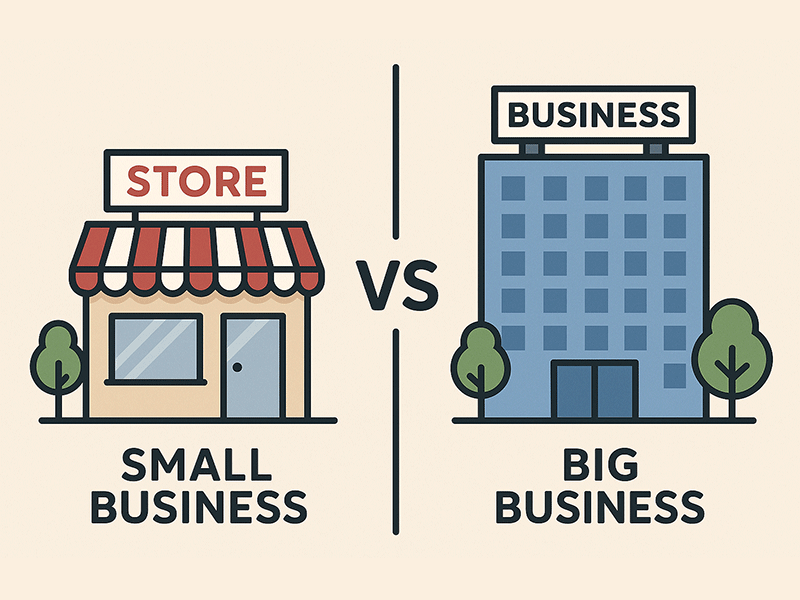When a big chain opens near your small business, it feels scary. They have lower prices, bigger marketing budgets, and name recognition. But small businesses have advantages that big companies can’t match. Here’s how to use those advantages to compete and win.
Focus on personal service
Big businesses serve thousands of customers. You can know your customers by name and remember what they like. Learn your regular customers’ preferences. The coffee shop owner who remembers you like oat milk. The hardware store clerk who knows which screws you bought last time. The restaurant server who knows you always skip the onions. This personal touch creates loyalty that discounts can’t match. Customers will pay more to feel valued and remembered. Train your team to have real conversations with customers. Ask about their day, remember details from previous visits, and show genuine interest in helping them succeed.
Be flexible and fast
Small businesses can change quickly. Big companies need approvals from corporate headquarters for simple changes. If customers ask for something you don’t stock, you can order it next week. If they need a service modification, you can make it happen immediately. If they have a problem, you can fix it on the spot. Use this speed advantage. When customers have urgent needs, be the business that says “yes” quickly while competitors are still checking with management.
Specialize in what you do best
Instead of trying to offer everything like big stores do, become the expert in one area. If you run a hardware store, become the go-to place for contractors who need professional advice. If you own a restaurant, perfect three dishes instead of serving a hundred mediocre ones. Customers will drive past generic options to get expertise they can’t find elsewhere. Position yourself as the specialist, not the general store. This type of niche positioning is one of the key strategies supported by the U.S. Small Business Administration, especially for growing and differentiating local businesses.
Build community connections
Big chains are the same everywhere. You’re part of your specific community. Sponsor local sports teams. Participate in community events. Partner with other local businesses. Support local charities and causes. These connections create customers who want to support you because you support their community. That loyalty is worth more than a 10% discount at a chain store.
Offer unique products or services
Find products or services that big businesses don’t carry. This might be locally made items, specialty products, or customized services. Partner with local makers and artists to sell their products. Offer services that require personal attention that big companies can’t provide economically. Give customers reasons to visit you that they can’t get anywhere else.
Compete on convenience, not just price
You can’t always match big business prices, but you can beat them on convenience. Offer services like free delivery for local customers, after-hours appointments, or house calls. Provide faster checkout, easier parking, or more convenient locations. Make it easier to do business with you than with your larger competitors. Sometimes saving time is worth more than saving money.
Create experiences, not just transactions
Big businesses focus on efficient transactions. You can create memorable experiences. A bookstore might host author readings. A bakery could offer decorating classes. A garden center might provide free soil testing. These experiences build relationships and give customers reasons to choose you beyond just buying products.
Use technology smartly
You don’t need enterprise-level systems. Simple technology can help you compete effectively. Use social media to show your personality and connect with customers. Send email newsletters with personal stories and local news. Use scheduling software to make appointments easy. The key is using technology to enhance personal relationships, not replace them. For practical tech tips tailored to small retailers and service businesses, check out the National Institute of Standards and Technology’s small business resources.
Partner with other small businesses
Create alliances with other local businesses that serve similar customers but don’t compete directly. A coffee shop might partner with a bookstore. A gym could work with a healthy restaurant. A pet store might team up with a veterinarian. Cross-promote each other, offer package deals, and refer customers back and forth. Together, you can compete against big businesses that customers see as impersonal.
Emphasize quality over quantity
Big businesses often compete on having the most options at the lowest prices. You can compete on having the best options with excellent quality. Carefully choose your products and services. Carry fewer items but make sure everything you offer is high quality. Train your team to explain why your offerings are worth the investment. Customers who value quality will pay more to get it, especially when you can explain the difference.
Stay close to customer needs
Big companies conduct market research and follow corporate strategies. You can talk to customers every day and adjust immediately. Ask customers what they need that they can’t find elsewhere. Listen to their complaints about big competitors. Pay attention to trends in your community. Use this direct customer feedback to make decisions faster than big businesses can respond to market changes.
Final thoughts
You can’t compete with big businesses by trying to be like them. Instead, focus on what makes small businesses special: personal service, flexibility, community connection, and expertise. Not every customer will choose you over big competitors, and that’s okay. Focus on attracting and keeping customers who value what you offer.
Start with one or two of these strategies that fit your business best. Build on your successes and gradually add more ways to differentiate yourself from larger competitors. Remember: big isn’t always better. Many customers prefer supporting businesses where they’re valued as individuals, not just transaction numbers.
